Photo courtesy Sri Lanka Brief
The Centre for Policy Alternatives, the institutional anchor of Groundviews, released today a report co-authored by Shilpa Samaratunge and I on hate speech online, looking at Facebook in particular.
The report is the first in Sri Lanka to focus on hate and dangerous speech in online fora, contextualising the growth of this disturbing digital content with increasing violence against Muslims and other groups in Sri Lanka. As the blurb on the front cover of the report avers,
The growth of online hate speech in Sri Lanka does not guarantee another pogrom. It does however pose a range of other challenges to government and governance around social, ethnic, cultural and religious co-existence, diversity and, ultimately, to the very core of debates around how we see and organise ourselves post-war.
The report looks at 20 Facebook groups in Sri Lanka over a couple of months, focussing on content generated just before, during and immediately after violence against the Muslim community. Detailed translations into English of the original material posted to these groups (including photographic and visual content) and the responses they generated are provided. It is the first time a study has translated into English the qualitative nature of commentary and content published on these Facebook groups, indicative of a larger and growing malaise in post-war Sri Lanka.
More generally, the study looks at the phenomenon of hate speech online – how it occurs and spreads online, what kind of content is produced, by whom and for which audiences. In addition to Sri Lanka, policy frameworks and legislation around online hate speech in Kenya, Rwanda, India, Pakistan, Canada and Australia are also flagged in the report.
As Shilpa and I note,
Ultimately, there is no technical solution to what is a socio-political problem. Sri Lanka’s culture of impunity and the breakdown in the rule of law is what affords the space for fascist groups like the Bodu Bala Sena, Sinhala Ravaya and Ravana Balakaya to say what they do and get away with it. In July this year, the Centre for Policy Alternatives (CPA) compiled a short brief to create awareness on the Constitutional and legal framework and available legal remedies regarding religious freedom and related issues, in light of the violence in Aluthgama. What is evident is that even without new legislation looking at online domains and content, there are a range of legal remedies and frameworks to hold perpetrators of hate speech accountable for their violence, whether verbal or physical. The issue is not the non-existence of relevant legal frameworks, but their non-application or selective application.
Though there is no easy or prescribed solution, progressive thinking, proactive content production, strategic interventions and careful monitoring can identity and neutralise the wider harm online hate speech can, if unchecked and allowed to grow, sustain and strengthen.
Civility, tolerance and respect for diversity are as hard to find online as they are in Sri Lanka’s mainstream party political framework even post-war. It would be a tragedy if the country’s only remaining spaces to ideate, critical reflect and robustly debate – which are online – are taken over by hate-mongers, to the extent they are allowed to do so in the real world. So many in Sri Lanka, in various ways, resist violence, whether verbal or physical. The challenge is to strengthen their voices and efforts in light of what is a growing trend of hate speech production online, which though by no means easy, is also not an insurmountable one.
Download the full report here.
Download just the Introduction and Executive Summary here or read it online here.
